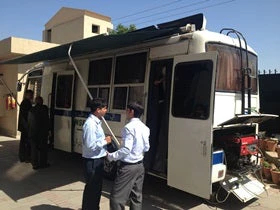
NADRA has gone beyond Pakistan to become one of the world’s leading purveyors of highly secure, integrated data solutions to the private sector and countries, including Kenya, Bangladesh and Sudan. That’s what the industry websites say. What doesn’t come across so clearly in the literature is that NADRA has set new global standards in the interface between technology, governance, and state-building during the eight years they’ve been at it.
Last week, a group of 16 senior Nepali government officials visited Pakistan to experience firsthand how NADRA’s mantra, “Empowerment through Identity,” is playing out in reality. Unlike me, the 16 officials representing a cross-section of the government of Nepal were converts already. As a government priority, the officials have already invested considerable time and effort in designing the basic groundwork and testing a Nepali system for roll-out in the near future. This knowledge exchange between Nepal and Pakistan was facilitated by the South-South Partnership hosted by the World Bank.
NADRA has 18,000 employees and is still growing. Close to meeting its primary mandate of registering 150 million Pakistani nationals, it has now moved to introducing a wide range of platforms and applications that respond to specific business needs, including data verification services, value-added services to the Pakistani diaspora, as well as advice and support to governments around the world.
NADRA has developed world class e-governance systems including border control, biometric e-passports, civil registration management systems, e-balloting systems, vehicle management solutions, as well as various corporate products for the private sector. When floods devastated Pakistan in 2010, NADRA rolled out pre-paid relief cards to the 20 million flood victims within three days.
NADRA is administering the database that came out of the Poverty Score Card exercise — a nationwide door-to-door census in Pakistan. The Benazir Income Support Program has shifted to technology-based cash transfers for 3.5 million families across Pakistan. With an integrated and responsive national data system, a quick response to natural disasters can be ensured and future social protection programs can effectively target the poorest and the most vulnerable segments of society.
The Nepali delegation learned that the quality of its staff and the robustness of the central database underpin NADRA’s achievements. They witnessed how the precision of the data is driving policy choices and strategic decisions both in the public and private domains.
The Nepalis saw that a national identity system works best when databases talk to each other across services. For example, as Pakistan gears up for general elections next month — as will Nepal for Constituent Assembly elections later in the year — the delegation was informed that unlike in the past, election authorities are using the NADRA database to verify the accuracy of the voter rolls. Previously election authorities had to carry out their own census to supplement the central database.
A trip to Lahore, the capital of Punjab, allowed the Nepali delegation to see how provincial authorities and the private sector are layering the NADRA database to meet local development objectives. The Punjab IT Board demonstrated how it is partnering with provincial and municipal authorities to further hone in on the local population to improve service delivery in terms of targeting, tracking, and feedback. Habib Bank, Pakistan’s largest private bank, explained how NADRA verification is helping improve the bottom line by easing compliance with transparency obligations.
The consensus was clear on the journey home. For a nation that invests close to 10% of its GDP in welfare transfers, a robust national identity system is central to improving delivery within ongoing and future development programs. More importantly, as federalism takes root in the future and services further decentralize, a national identity program would serve critical state-building functions to ensure that the political rhetoric of inclusion and identity translate into better development outcomes for all Nepalis.


Join the Conversation